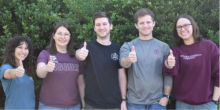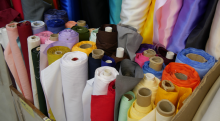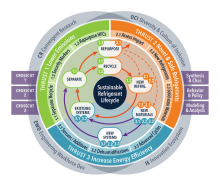sustainable materials
Building a roadmap for safer and sustainable material chemistries: Addressing the PFAS problem through informatics and data-driven chemistry
Scientific research increasingly demonstrates that chemicals and materials essential for everyday products threaten natural systems and human health. Transitioning to sustainable, circular, and low-carbon economies depends critically on having safer chemicals available. We propose that materials scientists should also account the impact of the health hazards of chemicals associated with the synthesis, processing, and manufacturing of materials.
CO2 Conversion Technology for Sustainable Carbon Materials
Bergen Carbon Solutions is a company transforming CO2 into a valuable resource by using renewable energy to convert excess greenhouse gas into solid, versatile industrial raw materials. The carbon capture and utilization (CCU) technology developed by Bergen has the potential to deliver a stable supply of carbon nanotubes and graphite, and also reduce manufacturers' exposure to geopolitical risks associated with raw material sourcing.
Freezer, Microwave, and Oven-Safe Food Packaging Solutions
Footprint specializes in plant-based fiber solutions to replace rigid plastics in food packaging. With a focus on freezer, microwave, and oven-safe applications, Footprint’s mission is to remove plastic from food-contact materials, creating packaging that is fully biodegradable The company's patented technologies provide moisture and oil resistance, extending the shelf life of frozen goods from 12 to 18 months.
Innovative Seaweed-Based Ingredients
Oceanium is a startup producing high-purity, seaweed-derived ingredients for food, health, skincare, and sustainable materials. Oceanium applies proprietary biorefinery technology rooted in green chemistry principles and is working on incorporating recycled wastewater in the process.
Oceanium’s products include:
Building Materials Made from Plastic Waste
Kubik is an African startup transforming hard-to-recycle plastics into sustainable construction materials. Addressing the pressing demand for housing and infrastructure across Africa, Kubik builds eco-friendly, modular, and cost-effective residential, commercial, and public facilities.
Biodegradation of Textile Fabrics Info-Sheets
In this combined PDF of three info-sheets, discover a summary of the research and the key findings from the Design for Transformation (D4T) Initiative's collaboration with Leeds University in the U.K. to conduct a literature review of the existing research examining the biodegradability of textile fabrics including colorants and finishing chemistries. The individual info-sheets – along with other resources – can be found on the Biomimicry Institute's Resources page.
Pagination
- Page 1
- Next page



